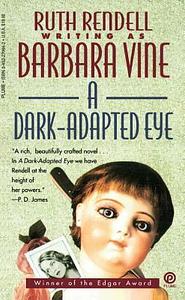Take a photo of a barcode or cover
This was a bit disappointing. I came up with (what I consider) a better twist than what actually ended up happening, hence the disappointment, the whole thing was a bit of a struggle to get through because of my ongoing reading slump so I did feel a bit robbed by the underwhelming ending. It was no-where near as good as the only other Barbara Vine book I’ve read, The Chimney Sweeper’s Boy, but it’s not put me off trying other ones of her books.
My main take away from the book is that I still hate adults who underestimate or are rude to children, just because they’re adults and they ‘know better’. Some passages where the narrator is being made to feel stupid by her ‘superiors’ actually made me a bit anxious, and remember back to when I felt the same, and it made me want to grab the annoying adults by the shoulders and shake some manners into them.
My rating: ★★
You can find more mini-reviews, book tags, and other content on my blog: http://inkandpagesblog.blogspot.co.uk/
My main take away from the book is that I still hate adults who underestimate or are rude to children, just because they’re adults and they ‘know better’. Some passages where the narrator is being made to feel stupid by her ‘superiors’ actually made me a bit anxious, and remember back to when I felt the same, and it made me want to grab the annoying adults by the shoulders and shake some manners into them.
My rating: ★★
You can find more mini-reviews, book tags, and other content on my blog: http://inkandpagesblog.blogspot.co.uk/
My first book of 2016. One of my favourite authors, as well as favourite genre.
Ruth Rendell/Barbara Vine always delivers what she promises to -i.e., toothy, dark, psychological mysteries, with lots of troubled minds and secrets, with a murder or two thrown in, which can be either immediate, or long forgotten.
This is the first book written by Ruth Rendell as Barbara Vine, and towards the end, she gives an explanation about both her names, which is as interesting as the story she has written.
In a Dark Adapted Eye, a woman murders, and is hung to death by law. It falls to her half niece to piece together the facts before and after the murder, to find out why she did what she did. Most of the book is from the view point of the niece, Faith, who comes across as a keen observer and an intuitive thinker.
Thoroughly enjoyed this one, though I had to re read the first 10% as the initial events were difficult to assimilate, being jumbled in time and place. Once I got the hang of the story, there was no looking back.
Ruth Rendell/Barbara Vine always delivers what she promises to -i.e., toothy, dark, psychological mysteries, with lots of troubled minds and secrets, with a murder or two thrown in, which can be either immediate, or long forgotten.
This is the first book written by Ruth Rendell as Barbara Vine, and towards the end, she gives an explanation about both her names, which is as interesting as the story she has written.
In a Dark Adapted Eye, a woman murders, and is hung to death by law. It falls to her half niece to piece together the facts before and after the murder, to find out why she did what she did. Most of the book is from the view point of the niece, Faith, who comes across as a keen observer and an intuitive thinker.
Thoroughly enjoyed this one, though I had to re read the first 10% as the initial events were difficult to assimilate, being jumbled in time and place. Once I got the hang of the story, there was no looking back.
My second Tackling the TBR read!
At 262 pages, A Dark-Adapted Eye felt ten times longer. This is definitely not a fast-paced, action-packed read. Instead, it’s much more of a character exploration, piecing together bits of Vera’s life, of Eden’s, in Faith’s attempt to discover who her aunts really were and just what could have led that fierce bond to suddenly break.
For the full review and more, head over to The Pretty Good Gatsby!
At 262 pages, A Dark-Adapted Eye felt ten times longer. This is definitely not a fast-paced, action-packed read. Instead, it’s much more of a character exploration, piecing together bits of Vera’s life, of Eden’s, in Faith’s attempt to discover who her aunts really were and just what could have led that fierce bond to suddenly break.
For the full review and more, head over to The Pretty Good Gatsby!
It has a slower pace at the beginning but picks up at the end. Is definitely worth it for the ending
Yes, we know 'what's' the crime committed, we know the 'who' but the 'why' is what makes it interesting, and the author manages to pull the reader deeply into the story. But I felt there was an emotional disconnect with the characters Vera or Faith or even Eden. And there were so many characters floating around initially that it was hard to keep track.
Wow! That was surprisingly good! I've read several of the author's Inspector Wexford books and they are fine, solid mysteries but nothing "wow". This book on the other hand - talk about masterful plotting. It is impressive, how intricate and weaving the the structure of the story is, without being confusing or pretentious. Lots of authors try to develop such plot structure, but few succeed.
The setting - 1930's & 1940's England rings so true, so vivid. The descriptions of the meals using rations, the cobbled together clothes, the lack of new toys for children....it's all spot on. I particularly enjoyed the bit about Eden's toiletries, comparing it to what 1980's/current women would have (the book is written in 1986).
This isn't a traditional mystery. The reader knows within the opening pages about who was murdered, who murdered them & that the murderer was hanged for the crime. What follows is the why and the how. Vine/Rendell develops the story masterfully, adding information at just the right time.
I almost didn't read this book because I wasn't a huge fan of the previous books I've read from her. I am so glad I decided to give her one more shot!
The setting - 1930's & 1940's England rings so true, so vivid. The descriptions of the meals using rations, the cobbled together clothes, the lack of new toys for children....it's all spot on. I particularly enjoyed the bit about Eden's toiletries, comparing it to what 1980's/current women would have (the book is written in 1986).
This isn't a traditional mystery. The reader knows within the opening pages about who was murdered, who murdered them & that the murderer was hanged for the crime. What follows is the why and the how. Vine/Rendell develops the story masterfully, adding information at just the right time.
I almost didn't read this book because I wasn't a huge fan of the previous books I've read from her. I am so glad I decided to give her one more shot!
Barbara Vine is a pen-name of Ruth Rendell, one of the most prolific authors of crime fiction today. Though the division is not absolute, the books she writes under her own name tend to be whodunits, and those she writes as Barbara Vine tend to be whydunits. This book fits the pattern. Right from the first page we know whodunit: Vera Hillyard was hanged for murder in 1950. Nearly forty years later a writer, Daniel Stewart, approaches people who knew Vera Hillyard as he wants to write a book, a reappraisal of the case.
The story is told by Vera's niece Faith, one of those approached by the author, as she remembers her life as a young girl visiting her aunts, and the events and tangled family relationships that eventually led to murder. The thing that strikes me most about Vine/Rendall's writing is that the characters have such depth to them, or at least those who are central to the action. In some crime novels, the plot is everything, and the characters tend to be almost incidental and one-dimensional. Here the characters are all described as seen by the narrator, and so through her own relationships with them. I find it hard to remember my own life in such detail, much less create one for someone else. Ruth Rendell manages to do it again and again.
Recommended for those who enjoy murder mysteries, with the emphasis on the mystery, rather than on the details of the murder: no descriptions of squeamish cops being nauseated at the autopsy, which seem to be almost obligatory in the current crop of crime novels.
The story is told by Vera's niece Faith, one of those approached by the author, as she remembers her life as a young girl visiting her aunts, and the events and tangled family relationships that eventually led to murder. The thing that strikes me most about Vine/Rendall's writing is that the characters have such depth to them, or at least those who are central to the action. In some crime novels, the plot is everything, and the characters tend to be almost incidental and one-dimensional. Here the characters are all described as seen by the narrator, and so through her own relationships with them. I find it hard to remember my own life in such detail, much less create one for someone else. Ruth Rendell manages to do it again and again.
Recommended for those who enjoy murder mysteries, with the emphasis on the mystery, rather than on the details of the murder: no descriptions of squeamish cops being nauseated at the autopsy, which seem to be almost obligatory in the current crop of crime novels.
Definitely not an 'unputdownable' book. A very complicated family tree and drawn-out portrait of a dysfunctional sibling relationship which culminates in murder.
dark
emotional
mysterious
sad
I've tried to read this two or three times now, I get almost through then have to skip to the end, I just can't get through it. Maybe the plot is dated, or its been done so many times now, but I was just bored and thought the psychological terror part to be sort of simplistic. Add to that nothing is really resolved it just seemed like a waste of time.





